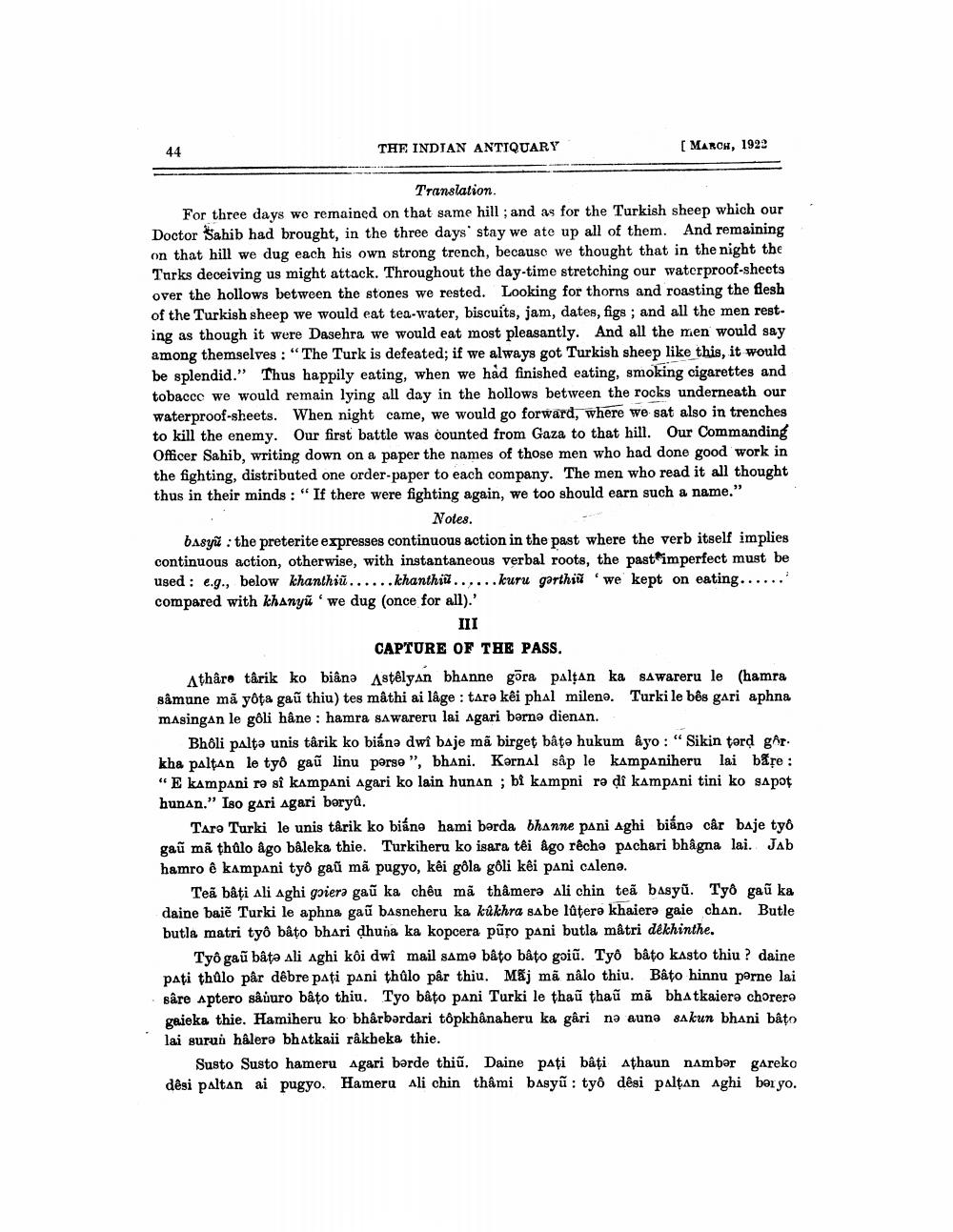________________
THE INDIAN ANTIQUARY
[MARCH, 1922
Translation. For three days we remained on that same hill; and as for the Turkish sheep which our Doctor Sahib had brought, in the three days stay we ate up all of them. And remaining on that hill we dug each his own strong trench, because we thought that in the night the Turks deceiving us might attack. Throughout the day-time stretching our waterproof-sheets over the hollows between the stones we rested. Looking for thorns and roasting the flesh of the Turkish sheep we would eat tea-water, biscuits, jam, dates, figs; and all the men resting as though it were Dasehra we would eat most pleasantly. And all the men would say among themselves : "The Turk is defeated; if we always got Turkish sheep like this, it would be splendid." Thus happily eating, when we had finished eating, smoking cigarettes and tobacco we would remain lying all day in the hollows between the rocks underneath our waterproof-sheets. When night came, we would go forward, where we sat also in trenches to kill the enemy. Our first battle was counted from Gaza to that hill. Our Commanding Officer Sahib, writing down on a paper the names of those men who had done good work in the fighting, distributed one order-paper to each company. The men who read it all thought thus in their minds: "If there were fighting again, we too should earn such a name."
Notes.
basyữ : the preterite expresses continuous action in the past where the verb itself implies continuous action, otherwise, with instantaneous verbal roots, the past imperfect must be used : e.g., below khanthiū......khanthit...... kuru garthiū 'we kept on eating...... compared with khanyű we dug (once for all).'
III
CAPTURE OF THE PASS. Athâro târik ko biânə Astêlyan bhanne gāra paltan ka sawareru le (hamra gâmune mã yota gaữ thiu) tes mathi ai lâge : tara kêi phal milena. Turki le bôs gari aphna masingan le gôli häne : hamra sawareru lai agari berno dienan.
Bholi palta unis târik ko biána dwi baje mã birget bâte hukum ayo: "Sikin terd gar. kha paltan le tyð gaữ linu parse", bhani. Kərnal sâp le kampaniheru lai båre : “E kampani ro si kampani Agari ko lain hunan ; bi kampni rə di kampani tini ko sapot hunan." Iso gari agari beryû.
Taro Turki le unis târik ko biáne hami bərda bhanne pani aghi biếnə câr baje tyd gaữ mã thólo âgo baleka thie. Turkiheru ko isara têi ago rêche pachari bhägna lai. Jab hamro ê kampani tyô gaũ mã pugyo, kêi gola goli kêi pani calene.
Teã bâți ali aghi goiera gaū ka chêu mã thâmera ali chin teã basyũ. Tyð gaū ka daine baiě Turki le aphna gañ basneheru ka kůkhra sabe lûtera khaiera gaie chan. Butle butla matri tyô bâto bhari dhuna ka kopcera pūro pani butla mâtri dekhinthe.
Tyô gaữ bâtə ali aghi kôi dwi mail same bâto bâto goiū. Tyő bâto kasto thiu? daine pati thulo pár dêbre pati pani thûlo pâr thiu. Môj mã nâlo thiu. Bâto hinnu parne lai sâre Aptero sâuuro båto thiu. Tyo bâțo pani Turki le thaữ thaữ mã bhatkaiera chorera vaieka thie. Hamiheru ko bhârbərdari tôpkhânaheru ka gâri nə auna sa kun bhani bâto lai surun hâlera bhatkaii rakheka thie.
Susto Susto hameru Agari borde thiū. Daine pati bâți Athaun nambar gareko desi paltan ai pugyo. Hameru Ali chin thâmi basyữ: tyô dêsi palan aghi ber yo.




